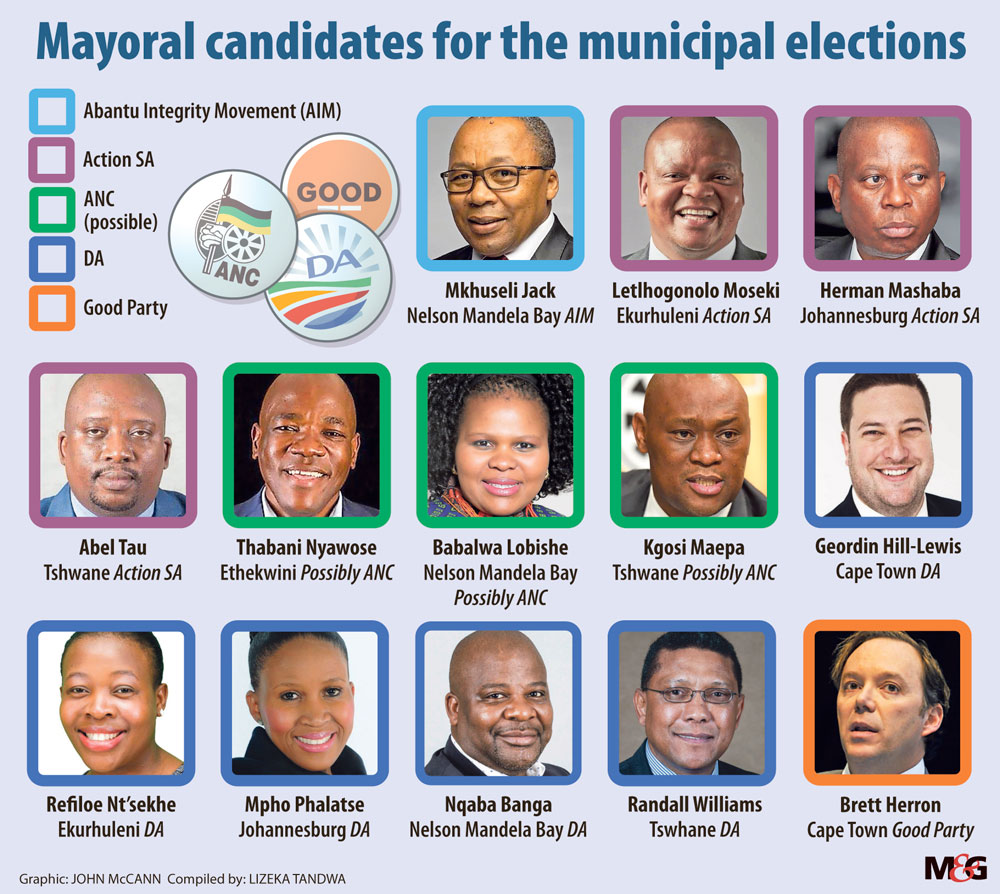The elections will be held on 1 November. (Photo by OJ Koloti/Gallo Images via Getty Images)
While the three major parties, the Democratic Alliance (DA), ANC and the Economic Freedom Fighters (EFF) are expected to wrestle it out for control of the country’s metropolitans in this year’s local government elections, independent candidates and smaller parties are hoping to make major upsets which could lead to hung metros yet again.
This week, the DA announced its mayoral candidates for five major metros during an elaborate media event in the Nelson Mandela Bay.
John Steenhuisen, the leader of the blue party, announced that the DA had chosen its former spokesperson and deputy federal chairperson Refiloe Nt’sekhe as its candidate for mayor of the City of Ekurhuleni, while retaining its mayor in the City of Tshwane, Randall Williams, as well as Nqaba Bhanga in Nelson Mandela Bay. Member of parliament and finance spokesperson Geordin Hill-Lewis is the party’s candidate in Cape Town.
Dr Mpho Phalatse, who was a member of the mayoral committee in Herman Mashaba’s DA-led government in the City of Johannesburg before the ANC grabbed back the mayorship, has been chosen as the DA candidate in the country’s economic hub.
Steenhuisen said the party had a duty to let voters know, well ahead of the elections, who would be tasked with running their cities and towns should it win in those municipalities or secure the majority share in a coalition government. He said this would ensure that candidates were interrogated, allowing voters to make an informed choice.
While the EFF and the ANC had not fielded any candidates — true to form — the parties proportional representation (PR) councillor lists are normally the safest best in distinguishing who will be the next mayor.
In a media briefing on Monday evening, ANC deputy secretary Jessie Duarte told the media that the party had submitted a list of 10 000 candidates to the electoral commission of South Africa with at least half of those as new entries. In KwaZulu-Natal’s eThekwini region, the Mail & Guardian understands that Thabani Nyawose — President Cyril Ramaphosa’s loyal ally — was number one in its list.
In Tshwane, sources told the M&G that regional chairperson Kgosi Maepe had made it to the top of the list while in the Nelson Mandela Bay, Babalwa Lobishe — a close ally of premier Oscar Mabuyane and in extension Ramaphosa — came tops in the party list.
On Tuesday the IEC’s chief electoral officer Sy Mamabolo said that 10 285 municipal electoral seats will be contested this year.
“There are 276 unique political parties that submitted candidates of which two are contesting in all the 257 municipalities in the country. The total number of independents currently captured is 944. In 2016 there were 855 independent candidates,” Mamabolo said.
The EFF and the ANC have indicated that they will be contesting all wards.
EFF leader Julius Malema told the media on Wednesday that the party is open to engagements to coalitions, adding that it would not be binding throughout municipalities in the country.

“This time around we are going into a coalition government ourselves as EFF. We think we have amassed the necessary experience and we have men and women who are now capable enough who can lead the successful municipalities and that coalition will be based on that. Be rest assured after these local government elections, there will be metros with EFF mayors either directly or through coalitions,” Malema said, adding that the party was targeting full control of the eThekwini municipality.
Meanwhile the Inkatha Freedom Party (IFP) and ActionSA led by former Johannesburg mayor Mashaba are also hoping to chop away support from the major three parties. The IFP is said to be pulling all of its resources towards taking control of municipalities in its home province of KwaZulu-Natal and maintaining its kingmaker status in Johannesburg, while Mashaba has set his sights on Tshwane, Ekurhuleni and Johannesburg and hopes to regain his mayoral seat through a coalition.
ActionSA’s mayoral candidate in the City of Tshwane will be contested by former DA regional chairperson Abel Tau and the Ekurhuleni mayor position contested by former Ekurhuleni official Letlhogonolo Moseki.
In Cape Town, former DA mayor Patricia de Lille’s Good party is hoping to take a chunk of the DA’s vote in coloured communities. The Good party together with smaller parties such as the Patriotic Alliance, Al jamah and Cape Coloured Congress have also submitted their lists to the IEC.
De Lille announced Western Cape member of the provincial legislature and former DA council member Brett Herron’s nomination as a mayoral candidate earlier this month.
A major thorn in the DA’s side has been the Freedom Front plus (VF+) since 2019. The VF+ delivered an upset to the DA in 2019 taking away the white Afrikaans vote and becoming the fifth biggest party in parliament. The converstive minority party maintained its momentum during the super Wednesday by-elections in November last year when it took a ward from the DA in the blue party’s safe haven of the Western Cape.